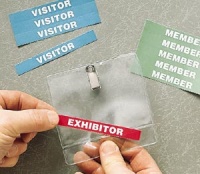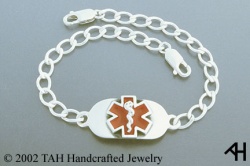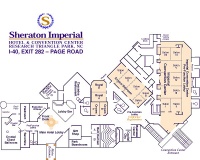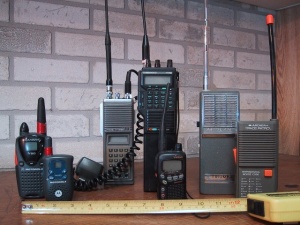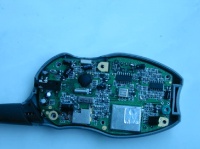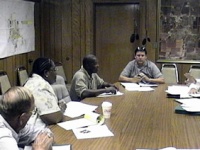User:Cdoane/Convention Security 2
Advanced Convention Security Officer Course
Introduction
In the previous course you learned the basics, the bare minimum. This course will attempt to go into more detail. More detail on each post, special situations, more on the importance of communication and equipment etc. This is meant as a guide only. Use information at your own risk *grin*.
==Chapter 1== POST DESCRIPTIONS
Stationary Post of Entry Control.-
You are placed at a door or gate for a period of time, during that time you only allow in those persons whom the event organizers have stated. Usually this entails the patron having a badge of some sort.
An important item to note about badges is you should be sure of the various types.
Example: say the weekend pass is blue, Friday pass red, Saturday green, and Sunday yellow.
Usually the badges will ID the event, the days that person can attend, and their status(vendor, patron, etc) as well as spaces for their names if they wish.
Sometimes there will also be special notations for those attending special items at the event like banquets with the stars or some such, even their pictures. If you are lucky you will be provided with a chair *grin*.
It is important to be alert to what badges are being used for what and note the ones are being flashed at you. The ones to the right are just two examples of the many you will come across.
There will be some patrons who will attempt to sneak in with improper badges. You may also hear things like "My friend is watching my stuff for me; I left the pass on my chair. If you let me in, I'll come right back and show you It.".
Proper Response:
'No' but you just can't say no, in the previous section you learned about the importance of being 'polite yet firm'. Your response to the above statement will depend on several factors, if the event has not yet started you may be able to get a staff member to get the persons badge from their chair or 'check their story'. Remember you are not to leave your post, if you can't get someone to help you, you can't let them in. If the event has started many organizers will have rules that no one, badge or not is to be allowed in. Its best to check with your supervisor in advance of taking your post since it is a likely occurrence.
Remember if someone doesn't have a badge or has a wrong badge NEVER treat them like a criminal. Treat them like they are someone who has genuinely made a mistake and you're helping, don't let them pass without approval but treat them gently. There will be more on special situations later in this course.
Also note that many events have switched to other methods of ID like wrist bands, while not foolproof it will help cut down on problems such as these. As before, remember to find out what your event will be using.
Stationary Post:
Event Room or Area-
In this position you will have a little more movement, it is still a stationary position in that you are limited to a specific area but at least you can walk around a bit more then the door guards, for example. In addition to normal security duties a VSO (Volunteer Security Officer) will be expected to be helpful. You will most likely possibly help handicapped to their seats or give directions. Amoung the things an event room or area security officer is watching for are pickpockets (if you see one immediately call supervisor, write down the description), troublemakers aka disruptive persons, and persons who don't belong (aka possibly of gotten past the entry guard somehow), and possible medical problems (dehydration etc). Your alertness will help the event go off well. You are the second line if someone gets past gate or door security, continue to glance around for badges etc. Don't assume anything, especially that just because someone is there means they are permitted to be. Remember, checking to see how far your authority extends is important. Who owns the grounds of the event? how far do event organizers wish you to go, how far can you legally go when dealing with a trouble patron? For example are you allowed to throw them out if they are making trouble or does someone else do that? These are questions you should have answers to.
Any other special situations you are likely to encounter here will be explained later in he course.
Stationary Post:
Dealer's Room or Area:
Similar to event room only, your whole purpose is to walk around and around staring at dealer's tables. It is recommended you do not bring your wallet with you at this time. While also watching for other problems, you're mainly there to keep an eye out for shoplifters. You're watching the hands of the patrons; do they take an item off the table and slip it into their pocket? or do they just carry it while they look around the vendor table? You are the vendors' spare eyes to ensure their livelihood is not ripped out from under them. Some of them live from event to event and can ill afford the loss. Keep an eye around you, watch for patrons perhaps looking at that Spock figure a little too long and are glancing about nervously. If you see someone shoplift do not approach. Call supervisor immediately, they may wish to keep the person in sight until the police arrive. The supervisor will also have instructions on how to proceed as always be alert and get a complete description written down.
In fact it is HIGHLY recommended you keep a notepad and pen on you at all times.
Normally though if you are alert enough and do your job well many would be thieves will not attempt theft, not while they are being watched. Just try not to freak out the normal patrons shopping. Be alert but be unobtrusive.
Another Dealer's Room or Area duty is that of an Undercover VSO. While the normal Dealer security is highly visible, these guys look like regular patrons (hint: being chummy with the visible security may blow your cover *grin*). You just walk around shopping but being quietly alert; you're the stealth security. Your duties are similar to the normal dealer security but may also include things like keeping shoplifters in sight until the police arrive aka a 'tail'. You will need to discuss your duties (as always, you guys sensing a theme yet? *grin*) with your Supervisor. The point of the undercover VSO is to catch shoplifters while they think they are being unobserved.
Dealer Help, is another vendor assistance position. Lets face it, a large part of many events are the vendors and they must be watched out for. Dealer Help is just that, you are what is called 'Dealer Slave', you may be asked to get them water, food, watch their booth, help them pack, unpack etc., act as a gopher, If you are at their booth you will be expected to help watch for shoplifters.
Pretty much you're there to make their lives easier.
Non-Stationary Post:
Roving Patrols-
With this job you have great freedom of movement, you will most likely have a prearranged patrol path. Usually this means you roam the entire event, watching for problems. You get to see a lot this way. While walking keep looking all around you, don't let that talkative entry guard distract you. Try to keep moving the more patrols you make, the less likely it is you will miss something. You may also be expected to give breaks to the stationary guards. Ideally they are partnered with another; no roving patrol should be less than two people.
One of the special problems for Rovers is a drunk. At any event with alcohol you will have them, at events in hotels many roving patrols are tasked with taking them back to their room, if they are awake. If they are not, try to wake them. This is the proper action for any unresponsive (unconscious) patient. They could be having a medical problem instead (many times Insulin Dependent Diabetics "appear" drunk, when in fact, they are suffering from Hypoglycemia (Low
Blood Sugar, you should look for medical alert tags, see picture to the right), though not all who need them will have them.
Alert tags usually come in necklaces, worn under the shirt or bracelets. They usually have this symbol and/or the medical 'staff and snake'. In any medical problem to which you are first responder please be alert and check for said tag. The medical condition of the person will be opposite of the symbol.
Also here's where having first aid will help you but we can't cover all possibilities so use your head. So its hard to tell if its a medical problem or if they are passed out because of the alcohol. Regardless, one of your first steps should be to call your supervisor, they may decide things are more serious then they appear and call 911. This is why it is important to register any medical problems with the event medical officer, and to check with the medical event officer if you have any concerns. If they are violent, step back and try to reason if unable and say it with us now "CALL YOUR SUPERVISOR" lol. Most cases you will be able to handle yourself. A number of drunks will simply be happy and/or convinced they are not drunk but usually will not be violent.
Many states have laws holding the person who sold them alcohol responsible, you will want to find out if your state has such a law and find out how your event organizers wish that to be handled within the law. You may be called upon by a room party bartender to eject someone who’s had a bit too many. Never handle situations where there is the possibility for trouble alone, not only will having the extra person help you to escort the person to their room but the extra eyewitness can protect you. This is in case the trouble patron tries to bring charges or lay claim to things that did not happen. CYB Policy (Cover Your Butt *grin*).
Gophers-
Also known as the event staff slaves; they do for security etc what the dealer's help does for dealers. They run errands, deliver messages that can't be sent over radio, find people that work for the event that other people working the event are looking for. In short, they make the staff's lives easier. Usually the ones assigned to this are teenagers or newbie staff. If you are such make sure you write down who the message is from, who it is too, and what it says. Do not rely on memory alone.
Registration-
Pretty simple, you sit at a table and take the money of the patron and give badges that allow for entry to the event, in addition to patron packets. Generally depending on the size of the event there will be different costs for different items like weekend passes etc. You should be familiar with prices and alert for persons who attempt to bluff their way in or try to steal a pass from the table. While not exciting it is an important position, this is the event organizers bread and butter. You must be very sure you are counting the money correctly and giving proper change, its very important to remember that you not let the money out of your sight or be left alone with it. If it is debit or credit be sure you understand all the equipment you will be expected to use as well as how to handle checks. Generally security with some type of medical condition or who simply prefer it will be seated there but expect if they are short handed and unable to find volunteers to find any staffer working the table.
Guest Security/Personal Escort-
This is where you get to escort the VIP. Only the most professional and best representations of the event get this job. You would be expected to make sure the Guest has everything they need, keep them to the schedule and keep their loving fans from trying to make off with their shoes. You are the wall that gives the Star peace of mind. Usually there will be a higher up from the event with the Guest at all times but you should endeavor to make yourself useful. If you are not actively helping, keep an unobtrusive eye out for those who would improperly waylay or harass the guest. If there is ever a physical problem get the Star out of there and call your supervisor, if there is a higher up from the event they will handle it. You must be able to balance the concerns of the event with the desires of the Star but always look for their well being and safety first.
Another Guest related job is Autograph Line VSO you promise nothing but pass on news that the event organizers will communicate to you. You will enforce line policy, example: no saving places in line and keep it moving. When the Guest is done, it will be up to you to help cut off the line.
==Chapter 2== SPECIAL SITUATIONS
If anything happens, especially unusual, observe and report, usually to your security supervisor. Some of the most likely special situations have been covered above under the heading of their specific job. Generally though if something happens, medical emergency etc, call for help; try not to leave your post, if you are stationary. In most cases if you are near enough to be first responder at a crisis it will be near your post anyway, if not there may be someone closer. Don't assume you are the only one who can help. However if you are, you must use your own judgment. In many events a radio call to the supervisor will have more help then you need sweeping down on a problem. No one wants things to get worse. We can't cover every problem, so as before just stay calm and use common sense. We know we are repeating ourselves but too often people allow emotions to speak for them when what they need is a clear head. Remember in a crisis you represent authority and people will look to you first for professionalism and leadership. Especially in cases of someone violent, you must be the cooler head, be calm, firm and speak with authority but do not try to 'one up' someone verbally or physically. If you find yourself threatened physically back away and call for help. Usually however by talking calmly and genuinely trying to help the person you will lessen the chances of it becoming violent. Many upset people simply want someone to listen to them and care and may calm down after a rant. In other cases if the person finds they can't 'get to you', they will just stalk off, just give your supervisor the description (yes again with the alertness *grin*) of the trouble patron so they can keep a collective eye open and then continue your duties.
Lost Child:
If a parent comes up to you and informs you that they've lost their child your first step is to get a complete description (name, age, gender, clothing from shoes to top, hair color, eye color etc).
Then put out a lost child call over the radio (if there is more then the security channel in use by the event, you may want to put it out on the main radio channel as well), immediately people will react those in hearing of security radios may even try looking for the child themselves but it is with security reaction we are interested in here. And also another reason why a map of the event could come in handy.
Rovers will check all parts of the event walkways, female and male rovers will check the proper bathrooms as well as all general parts of the event. They will usually be assisted by the gophers.
Entry Point persons will watch for the child at their respective points, especially those at the primary exit points.
Dealer and Event security will all look in their areas. You sense a theme? lol. In short don't leave your post open. There are others who are looking as well, if you leave your position the child may wander right through.
If you reason to believe of foul play, example: The Ex is trying to make off with the kid, call your supervisor IMMEDIATELY. They in turn will pass the news up the chain of command quicker then warp, they will be the ones to call the Police. If you see the child and person in question keep them in sight and make sure police can find them. As always use your judgment, knowledge of the law (example: rules of force, citizens arrest), and knowledge of event rules and you should be fine.
After finding a lost child, inform all security over the radio, this has the added bonus of the parent or guardian is most likely near a security officer and will hear the announcement. Then bring the child to the Central Security Command Center, or what your event has for it for pickup.
This is fairly standard procedure but you will want to check with your specific event for their set up, just in case.
When calling 911 use your judgment, usually at the first sign of a real crime its best to call your supervisor without delay, better safe then sorry. If you are a supervisor it is your responsibility to ensure your people know their duties.
==Chapter 3== COMMUNICATION AND THE RADIO.
Now here's where communication is key. It is important that you try to find out able all possible problems, duties, backup plans etc before taking your post. Also along with checking your gear, asking questions should be tops on your list. It’s also just as important that your supervisors give you a briefing. They will be experienced and will have a good idea how the event organizers like the more common situations to be handled.
You can always ask if you are unsure, don't feel stupid. After all "..The only stupid question is the unasked one" (DS Holcomb). Your preparation before assuming your post will save you a lot of problems later on. Now there is alot of equipment that you will find useful, these were detailed in the previous course but the main one is radios.
Two-Ways (walkie-talkies or two-way radios) are the lifeblood of event communication. It simply is not efficient to have gophers deliver, by hand, every single routine message. So modern VSO's find that a radio is part and parcel with the job.
Radio background information:
A walkie-talkie is a portable, bi-directional radio transceiver, first developed for military use. Major characteristics include a half-duplex (only one can receive and transmit at a time) channel and a push-to-talk switch that starts transmission. The typical physical format looks like a telephone handset, possibly slightly larger but still a single unit, with an antenna sticking out of the top.
"Hand-held transceivers became valuable communication tools for police, emergency services, and industrial and commercial users, using frequencies assigned for these services.
Low-power versions, exempt from license requirements, are also popular children's toys. Prior to the change of CB radio from licensed to un-licensed status, the typical toy walkie-talkie available in retail stores in North America was limited to 100 milliwatts of power on transmit and the 27 MHz citizens' band channels.
Al Gross also worked on the early technology behind the walkie-talkie between 1934 and 1941, and is sometimes said to actually have invented it.
The personal walkie-talkie has now become popular again with the Family Radio Service. FRS operates in the GMRS (General Mobile Radio Service) band, which is also used for business walkie-talkies and mobile radios. While FRS walkie-talkies are popular toys, they are also a useful communication tool for business and personal use." (Radio background information from wikipedia.org).
As you can see from the first Walkie Talkie picture, radios are varied items but most of them will have the following:
- On/Off Knob, usually on top.
- the "Talk" button, usually on the side
- "Channel Select", on the front normally, two buttons that may sometimes have a picture of up and down arrows
- a "Call" Button. The most annoying sound ever. This will 'Beep' all compatible radios on your channel. Usually on front.
- "Volume" Control, usually on front, usually 'plus' and 'minus' signs.
- a View screen on front.
Remember your radios may be more or less complicated then the listing above, be sure to read your directions. Also before bringing private radios to an event for security, make sure they will work with what the security staff is already using.
At events you may run into the problem of private persons with radios and may possible run out of channels. One way event staffs have worked around this problem is the 'sub-channel'.
For example most radios will work from channels 1-14. A Two-way with sub-channels will have 1-4 sub-channels for each of the main channels.
Example: Your Security Staff Supervisor assigns channel 3 with sub-channel 2 so your security channel would be 3-2.
There should be directions with your radio how to do this, if not ask.
This will not completely get rid of non-security personnel but it will help. Also you will want to try to go for radios with 2 mile or more range. Depending on what size events you plan to use them at. Remember wires, buildings etc can cut down on your range.
Also ear pieces (there is usually a plug for them) this will allow you to hear your radio while in noisy conditions, very useful.
What did he say? or Radio etiquette.
You will want to check with your event contacts regarding their specific radio etiquette but here are a few basic suggestions:
- When speaking, hold the radio at least 5-8 inches from your face. This will prevent your voice from becoming distorted.
- Speak clearly and carefully. No need to do a William Shatner but mumbling or speaking rapidly will just get you a lot of 'what did you say?'
- When speaking hold down the "Talk" button for at least one full second before speaking this will ensure the channel is fully open when you begin. Also as soon as you are finished release the button; if you don't you will hold the channel open and no one else can speak.
- Keep chatter to a minimum. The entire security staff doesn't need to know about the latest X-Box game you bought, if something important is happening un-needed chatter will prevent it from being heard.
- Keep things as professional as possible, you never know whose overhearing.
- Always remember to learn all the channels your event will be using, you never know when you might need them. Also note security channels may change constantly, you should keep up on changes.
- A good guiding rule is to ID yourself them whom you wish to speak to and wait until you have their attention.
These are a few of the most common Radio Terms:
Copy or good copy- I understand what you just said, also if given an instruction can mean you understand and will obey. In the second case ‘Copy That’ is usually stated.
Example 1:
Guard one: “watch out for shoplifters"
Guard two: “Copy that"
Example 2:
Guard one: “Meet me in the event room"
Guard two: “Copy That"
Do you Copy? or Come In[insert name here]-Can you hear me, looking for specific person or set of persons.
Example 3:
Guard one: “My shift is over, where is my relief?, Do you Copy?"
or
Guard one: “Come in Supervisor, my shift is over where is my relief?"
Repeat or Say Again-you are repeating or asking to be repeated what just went over the airwaves.
Example 4:
Guard one: “I repeat look for 5’6 female with the free water for the guards."
Example 5:
Guard two: “Say again guard one?"
Out-I understand and am done with this conversation.
Example 6:
Guard one:"Get here soon. Out."
Over-I said something and want a reply.
Example 7:
Guard one: “Will you be here soon, over"
- Note it is unneeded to say 'over and out'. Its difficult to say 'I expect a reply' as well as 'I am done with this conversation'.
Stand by-hold for further transmission, not sure how long it will be.
Example 8:
Guard one:
“Getting information from patron now, stand by."
Wait One-Hold briefly for further transmissions. Usually few seconds.
Example 9:
Guard one: “Let me find the page in question on this table, Wait one."
Sample Conversation:
Guard one-Derrick
Guard two-John
Derrick: "Derrick to John, Derrick to John"(if no answer ‘Come in John’ would be ok or some variation on it.)
John: "John here."
Derrick: "Don’t forget...(blanks out)"
John: “Say again? didn’t copy."
Derrick: “I Repeat Supervisor said to watch for shoplifters, over."
John: “I Copy, Out."
==Chapter 4== SO YOU'RE A SUPERVISOR
These are the big leagues. You’ve proven yourself as an excellent VSO with great leadership qualities. Now what? *grin*.
Leadership is something you will continue to learn as time goes on. There are levels, usually there are shift supervisors, on up. All, however, have a great deal of responsibility. What will be listed below will be things you will want to keep in mind.
Make sure you understand all possible problems and what the event coordinators expect, by now you should have a pretty good idea if this is an event you've worked before and even if its a new event you should have a good idea of what you will need to ask. If not, learning as you go is possible, especially since by now you should have been able to show how well you can think on your feet.
Generally you need to,
Make sure you tour the place in advance, with a member of the senior event staff if possible. Three of the main things you'll want to make sure you discuss are identifing the areas where they will want security and identify what type as well as when they need the security. You will also want to know what equipment you will need. And what they will provide in addition to what you will provide, what’s left will need to provided by the guards themselves.
Especially find out if there are freebies for the guards, this is their only payment and the good ones work hard for it.
Once that’s done you will need to start filling slots, generally there will be some sort of procedure in place for applicants. Some supervisors will check references, some won't. As long as you remember that you’re ultimately responsible for filling every staffing hole and any problems caused by your security people.
So be as careful as you like, it’s your neck. You will need to set shifts. Ideally this could mean 1-2 hour chunks, depending on how many people you have will depend on how many rotations (example after 1-2 hours some rovers could rotate to a stationary post, freeing those people to patrol, this will help prevent your people from becoming bored and listless.) you will need to do. Usually though it is not recommended to work a person more then 8 hours. As stated depending on how short-handed you are will depend on how many hours each person works. And it is not needed that a person work all at once, 2 hours here or there over the course of the weekend will allow the officer to still attend some of the events. At the same time they will be able to fulfill their security duties.
Your are responsible for them, make sure they understand what you want out of them, how you want them to act in certain situations, make sure they are being checked on and have all they need to complete their duties. Many security officers will work harder knowing their supervisor cares and will support them.
You may get a bad seed, depending how bad, you may need to eject them from your staff. If you do just try to learn from the mistake and slowly build a 'reserve force' of people you know you can call on in certain events. These people will tend to know people whom they vouch for and so on.
This can’t be stated enough make sure you tell your people all that you want them to know, don’t assume they will know what to do, especially in unusual situations like a lost child search.
A good idea would be to sit down long before the event and write down a list of what you want them to know. Some Senior VSO's even hold mini training sessions to prep their people. Since its your head how you go about about making sure you have a professional and qualified staff is up to you.
